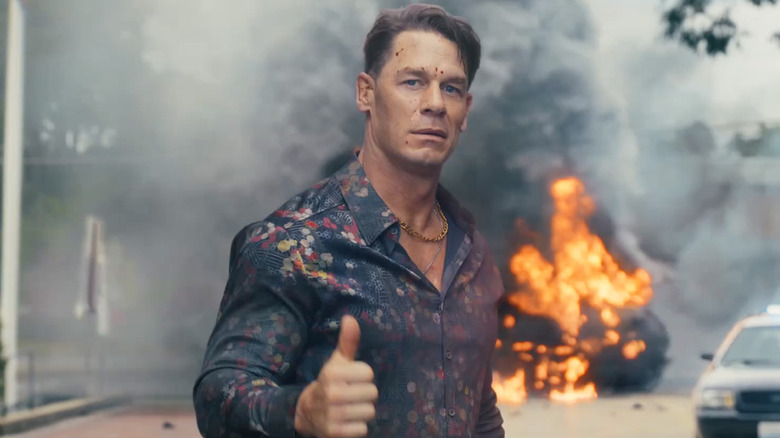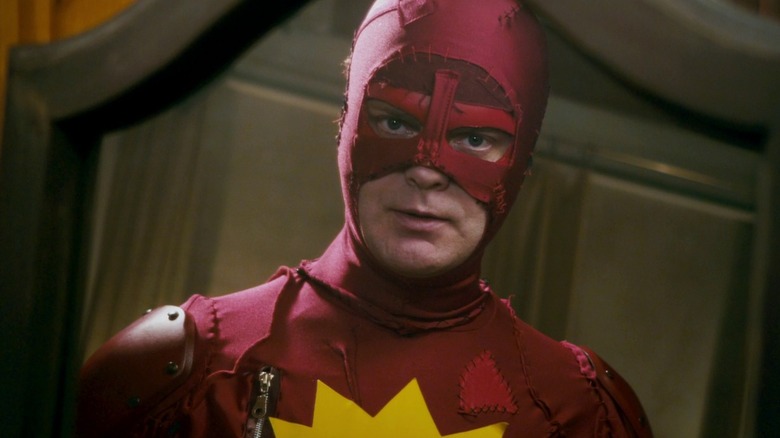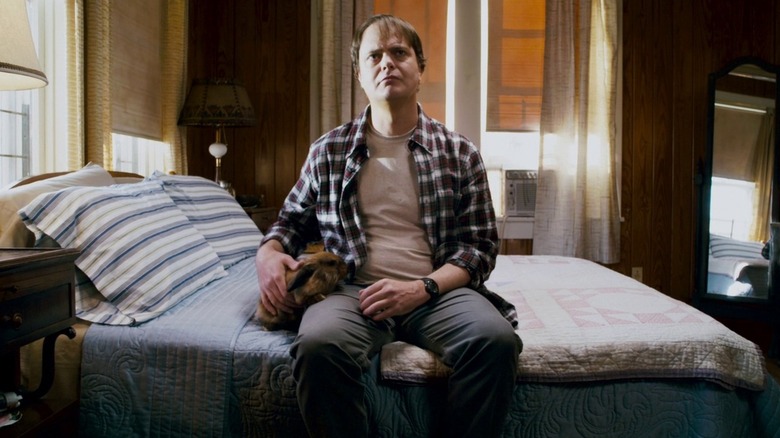Peacemaker Is A Spiritual Successor To A Cult Superhero Flop, According To James Gunn
James Gunn's chaotic HBO Max original superhero series "Peacemaker" is wholly original despite being based (loosely) on a DC Comics character created in the 1960s, but there's another of the writer and director's previous works that he's pulling from to make the show (and no, it's not just "The Suicide Squad"). In an interview Gunn did with actor and friend Rainn Wilson for Interview Magazine, Gunn said "Peacemaker" is the spiritual sequel to his 2010 subversive superhero flop, "Super."
Wilson, who starred as the lonely and broken-hearted wannabe superhero Frank Darbo in "Super," wasn't completely sold on Gunn's comparison between the two, but there are quite a few thematic and tonal similarities between them, even if they're operating in wildly different universes. While Darbo may have never had powers or even sci-fi tech as his amateur superhero alter-ego, the Crimson Bolt, he still has an awful lot in common with Peacemaker and his alter-ego, Christopher Smith (John Cena). Sure, Smith has the high-tech helmets created by his late super-scientist neo-Nazi father, the White Dragon (Robert Patrick), but he also has the same crippling loneliness as Darbo, and they're both lost men with some rather violent ideas about what justice looks like.
Shut up, crime!
Gunn told Wilson that "Peacemaker" is the "spiritual successor" to "Super," and explained it like this:
"'Peacemaker' is about Christopher Smith, a guy who puts on a costume. But it really is about the guy below the costume. His reasons for putting on that costume are various, but they aren't all good and a lot of them have to do with who his father is. But in the same way in 'Super,' it's very much a story about Frank Darbo and it's about a guy who puts on a costume. And it also has that sort of tonal mix of the dramatic and the comedic, but it has a grounded, full character at the center of it. It also has a sociopathic sidekick?"
In "Super," Darbo tries to become a vigilante crime-fighter who hits people with a hammer and yells "shut up, crime!" at his enemies after his recovering addict wife, Sarah (Liv Tyler), leaves him for her charismatic dealer, Jacques (Kevin Bacon). He teams up with local comic shop cashier Libby (Elliot Page) and the two try to clean up crime and go after Jacques, though they're in way over their heads. Like "Peacemaker," "Super" varies between being brutally violent, darkly hilarious, and totally heartbreaking. "Super" has a deeply bittersweet ending that can make even hardened audience members cry, with Frank's loneliness at its center. In the phenomenal second season of "Peacemaker," we get to see Chris contend with his own loneliness even more than in the first season, and it certainly echoes Frank's hollow existence. Gunn and his work have matured since "Super," however, and it seems like "Peacemaker" will potentially have a more hopeful outcome for its broken hero.
Super showed a funny but tragic side of vigilante justice
Both "Peacemaker" and "Super" balance the bizarre with the totally earnest and heartfelt, and their protagonists both start their stories as total sad sacks. The biggest difference between them is that Chris Smith has the 11th Street Kids, his group of misfit friends, while Frank truly only has Libby. Gunn has come to be known for stories about found families, and while Chris seems to have found his, Frank's existence is a much sadder, lonelier one. In fact, Wilson even pointed out to Gunn that Chris has "several" sociopathic sidekicks, and he's right. Libby feels like an early version of the similarly socially inept Vigilante (Freddie Stroma), but Chris also has love interest and rage beast Emilia Harcourt (Jennifer Holland), goofball badass-in-training Leota Adebayo (Danielle Brooks), fellow sad sack John Economos (Steve Agee), and Eagly, his freaking pet bald eagle!
Though "Super" is quite a bit rougher around the edges than "Peacemaker," even by Gunn's own admission, it's still fascinating to see how the idea of a broken, lonely vigilante developed over time. Frank is less aggressively, outwardly toxic than Chris, but they both have some truly awful traits that make them unusual protagonists to follow. Somehow, Gunn found a way to make the audience empathize with these deeply damaged men and hope for their rehabilitation, and honestly, that rules.


